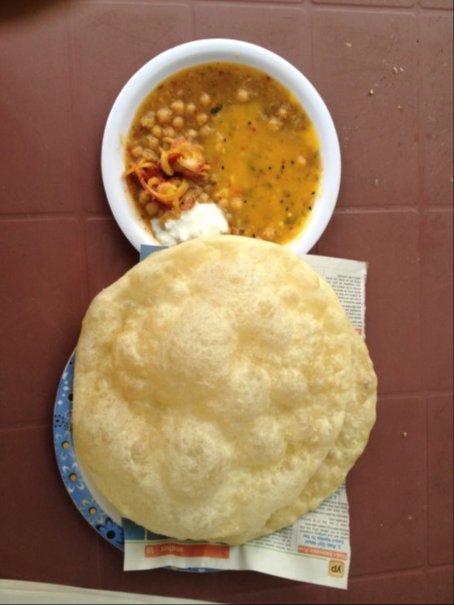
Halwa Puri

Halwa Puri
Halwa Puri in Karachi
It seems a bit illicit to be having halwa puri on a weekday, but here I am, reading the newspaper at a plastic table outside my neighborhood’s local juice bar/snacks stall on a Wednesday morning.
At the next table, a group of boys in school uniforms are clearly cutting class to be here. One of them runs across the street to get cigarettes from the corner grocer. ‘Get the expensive ones,’ a boy calls out. They smoke with the swagger of the newly initiated, one makes a phone call to another friend to find out if they can hang out with him, another looks a bit nervous.
As they leave, a boy bursts into an old Indian song: ‘life is a beautiful journey.’ I almost want to laugh, because that song is so far before his generation.
But I wish I had their problems. It’s a beautiful day: overcast and windy, the kind of weather that makes living in Karachi tolerable. It reminds me of being 19, wondering what kind of future I’d have as I stared out at the city during my daily commute.
I’m 29 now. I’m tired and stressed out. The recurring insomnia of my teenage years is back, and there’s nothing to eat at home, save for a bunch of wilted kale. Story ideas aren’t panning out, and there’s a looming deadline for a writing project that has been months in the making.
But halwa puri beckons, and halwa puri can make it all okay.
Halwa puri—the greatest of all breakfast meals in this city—is theoretically reserved for Sundays. This is not a breakfast for those with weak stomachs (or knees, given the queues). Halwa puri comprises freshly fried bread (puris), spicy curries of chickpeas and potato, a side of pickles and yoghurt, followed by a sticky semolina halwa. It is mostly consumed as a takeaway, wrapped up in greasy plastic bags and newspaper, or consumed at a roadside restaurant while batting away flies. It’s almost tailor made for Sundays. It is the perfect morning-after breakfast—for those who wake with a blind headache, as Sia sang—the puris arriving with enough oil to soak up the excesses of the night before.
But halwa puri is so much more than just a meal, or a convenient breakfast option. It evokes nostalgia—of past meals shared with friends and family—and there’s a comfort that it’ll always be the same combination. That is a rarity in a city which is constantly falling apart and being clumsily put back together. Roads and landmarks disappear overnight; lives are snuffed out in seconds. But just like Karachi—which has been on the verge of collapse for decades—halwa puri is still here. Even when the city is shut down—because a political party has called for a strike or the streets have filled up with water after torrential rains or there has been a night-long power breakdown—someone is always selling halwa puri somewhere. It really is the breakfast of survivors.